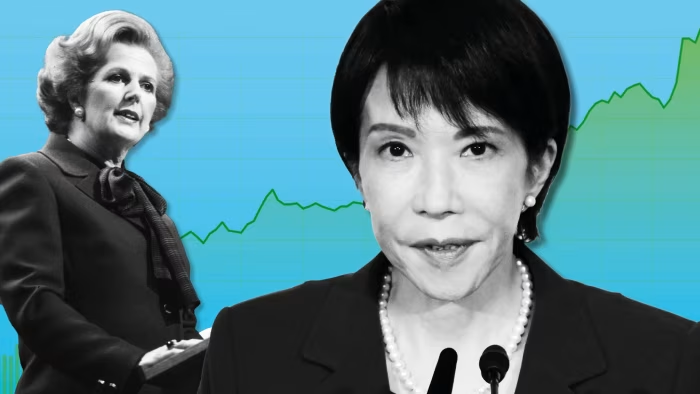In recent developments within Japan’s political landscape, Sanae Takaichi has emerged as a significant figure following her election as the leader of the ruling Liberal Democratic Party. Often likened to Britain’s first female prime minister, Margaret Thatcher, Takaichi’s ascendance seems poised to further invigorate Japan’s equity market, which has already surged by approximately 40% over the past six months. Despite this optimism, Japan’s bond market faces challenges, with the yield on 10-year Japanese Government Bonds (JGBs) climbing from 1.1% to nearly 1.7% this year, resulting in substantial capital losses for bondholders.
At 64, Takaichi is considered a political heir to her close friend Shinzo Abe, who held the prime ministerial position from 2012 until his assassination three years ago. Takaichi and Abe shared a conservative political outlook, having been elected to the House of Representatives in 1993. Under Abe’s leadership, Japan’s stock market flourished, encouraging corporate profitability and returns for shareholders, while also addressing regional defense responsibilities—an area Takaichi has indicated will remain a focus.
The implications of Takaichi’s leadership extend beyond domestic policy; her right-leaning governance is expected to resonate favorably with U.S. President Donald Trump, particularly regarding increased defense spending. Following her election, defense-related stocks experienced a boost, including notable companies like Mitsubishi Electric, which trades at 21 times earnings, with projected growth exceeding 10% in the coming years as defense contracts materialize.
Japan is also a leader in robotics and factory automation, sectors that have faced challenges due to stalled orders from Chinese manufacturers. However, a recovery in China could offer new opportunities. Despite concerns over excess capacity in electric car manufacturing, sectors like semiconductor manufacturing are drawing fresh investments. For instance, Yaskawa, a prominent Japanese company, specializes in semiconductor robotics, positioning it well amidst evolving market demands. Further innovations from Japanese firms include advancements in automating food handling and agricultural tasks like rice farming, as well as developing new sewing robots.
In recent years, Japanese companies have attracted attention from activist shareholders advocating for improved returns. Nonetheless, Takaichi’s more nationalist political stance may temper such corporate activism, especially if perceived as favoring short-term profits over sustainable growth. Interestingly, firms like Toppan Holdings have begun to announce ambitious strategies to enhance profitability autonomously, demonstrating a shift toward proactive corporate governance. Toppan, known for its print technology, is investing proceeds from divested stakes into semiconductor photomask production, a vital component in chip manufacturing.
Moreover, Toppan’s innovative initiatives include creating floor-sensor equipment aimed at assisting older individuals living alone, showcasing how advancements in AI and robotics can address the challenges posed by an aging global population. This demographic trend may become a significant long-term growth driver for Japanese companies that excel in technological innovation.
In terms of economic stability, the reaction to Takaichi’s leadership has raised speculation regarding interest rates, which have remained low amid prolonged quantitative easing measures during Abe’s tenure. However, with inflation in Japan holding steady above 2% for the past three years and the recent increase in landline prices by NTT after three decades, the environment for interest rates may soon shift. Takaichi’s core constituency of pensioners may have limited patience for rising living costs, drawing a parallel to Thatcher’s approach during her premiership amid inflationary pressures.
Should interest rates rise under Takaichi’s leadership, financial institutions—integral to the Japanese stock market—could see significant gains. Current holdings like Sumitomo Mitsui Banking Corporation are viewed as potential hedges in this evolving scenario. A rate hike could strengthen the yen, initially impacting exporters, but ultimately benefiting foreign investors in Japanese equities.
As Japan navigates this shifting landscape, Takaichi stands at a crossroads that could define her legacy, potentially earning her the moniker of the “Iron Maiden” if she embraces the tough decisions necessary for sustainable economic growth. Investors are keeping a watchful eye on core stocks, including Mitsubishi Electric, Yaskawa Electric, Toppan Holdings, and Sumitomo Mitsui Banking Corporation, as the market responds to these unfolding dynamics.







